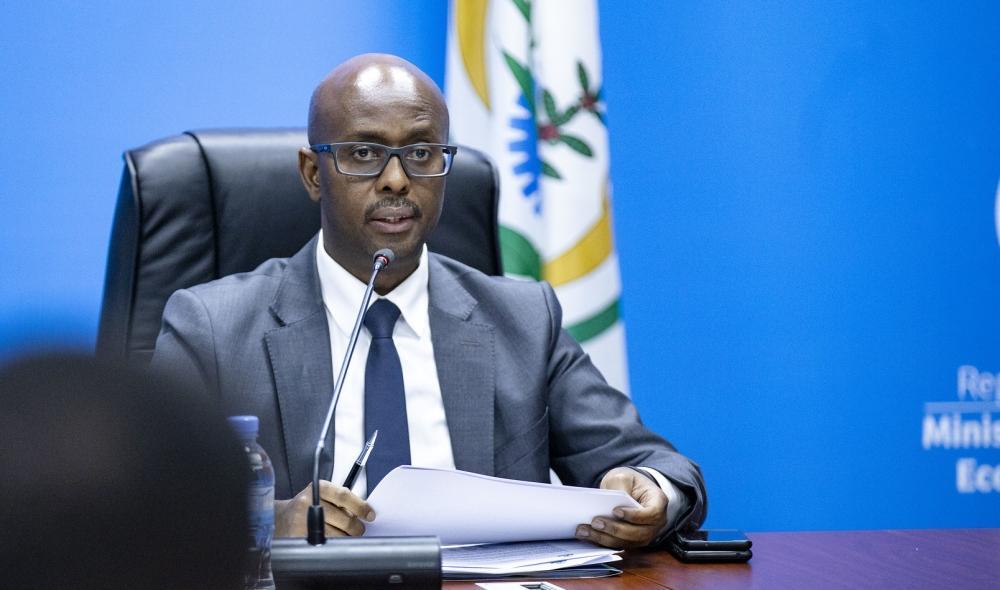Africa-Press – Rwanda. Last week Moody’s Ratings upgraded Rwanda’s credit outlook from negative to stable, implying that risks to the country’s debt repayment capacity have notably declined.
The global rating agency also maintained the country’s position at B2 for both local and foreign currency debt.
It now sees a lower likelihood of future downgrades, affirming the government’s progress in sustaining growth, securing international support, and managing large-scale infrastructure investments.
According to Yusuf Murangwa, the Minister of Finance and Economic Planning, the decision by Moody’s is an affirmation of the government’s prudent economic management and strategic reforms.
“It signals to the global investment community that Rwanda is a stable and attractive destination for capital,” he told The New Times, adding that this also demonstrates the government’s ability to manage risks.
Risks have subsided
Moody’s observed that the change in the outlook to stable reflects its assessment that downside risks for Rwanda stemming from the conflict in eastern DR Congo have diminished.
These tensions had raised concerns about Rwanda’s access to international financing and foreign currency.
The June 2025 peace agreement, facilitated by U.S.-led mediation and supported by international and regional partners, has significantly reduced these risks.
According to the finance ministry, by the end of the fiscal year 2024/25, all anticipated disbursements were successfully received, and development partners continue to actively fund new projects.
Meanwhile, the tourism sector, a vital source of foreign exchange, grew by 6 per cent year-on-year in early 2025, despite regional tensions, according to World Travel & Tourism Council.
Investment to spur growth
In its assessment, Moody’s indicated that government’s large investment in the new Kigali International Airport and RwandAir aposes fiscal and debt risks as the size of its remaining investment exceeds 7 per cent of its gross domestic product (GDP).
However, the ratings agency maintained that the risks are balanced by the recently approved multi-year tax package or tax reforms that provides some fiscal flexibility and the authorities’ track record of effective fiscal adjustments and debt management.
Rwanda’s economy has demonstrated consistent growth, with a real gross domestic product (GDP)increase of 7.8 per cent in the second quarter of 2025, up from 6.5 per cent in first quarter of 2025, according to the National Institute of Statistics Rwanda (NISR).
According to the Ministry of Finance, the new airport, set to commence operations by 2028, will further accelerate this growth trajectory, indicating that the project aims to increase passenger capacity from 1.7 million to 7 million annually in its first phase, with a second phase targeting 14 million passengers per year upon completion.
This is expected to bolster the country’s position as a regional hub for tourism, trade, and logistics, attracting increased foreign investment and creating new business opportunities.
To minimise cost, Rwanda is employing a blended finance approach: roughly two-thirds of the airport cost is covered by Qatar Investment Authority, while the remainder is financed through concessional loans, bilateral support, and private sector partnerships.
“This investment is carefully sequenced as the fiscal deficit may temporarily rise to around 7.4 per cent of GDP in 2025/26 but is projected to fall below 5 per cent by 2026/27 as newly implemented taxes start generating revenue.”
New reforms
Rwanda introduced new tax reforms in the first half of 2025, expected to raise revenues by 3 percentage points of GDP by 2029. This, according to the ministry, will bring tax revenue close to 18 per cent of GDP.
This is expected to expand fiscal space, enabling strategic investments to drive growth while keeping debt on a sustainable path. Although debt may increase slightly during construction, it is projected to stabilise and gradually decrease after 2027–28.
While these projects carry some short-term risk, they are designed to transform Rwanda into a regional hub for tourism, conferences, logistics, and trade. Moody’s notes that, although the debt burden may rise temporarily, the long-term impact is positive, generating higher growth, diversified exports, and stronger economic resilience, the ministry stated.
“De-risking our economy through transformative investments such as the new Kigali International Airport, financed through a smart blend of foreign investment and concessional funding, are calculated investments in our future growth, designed to establish Rwanda as a regional hub,” Murangwa stated.
For More News And Analysis About Rwanda Follow Africa-Press





